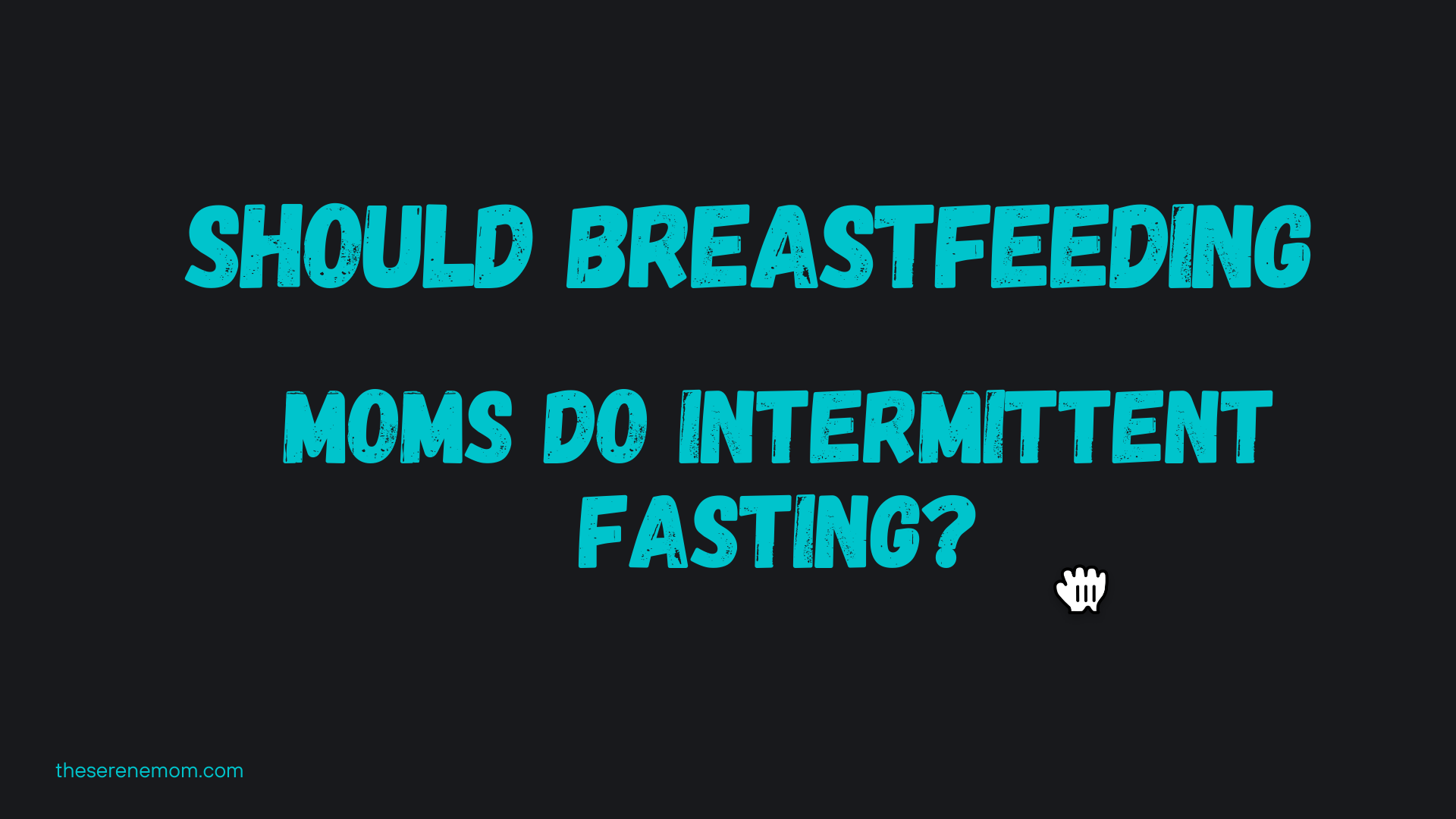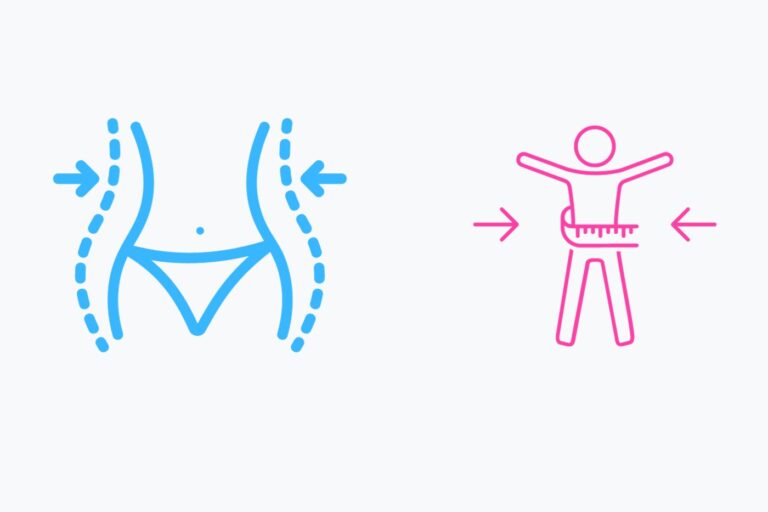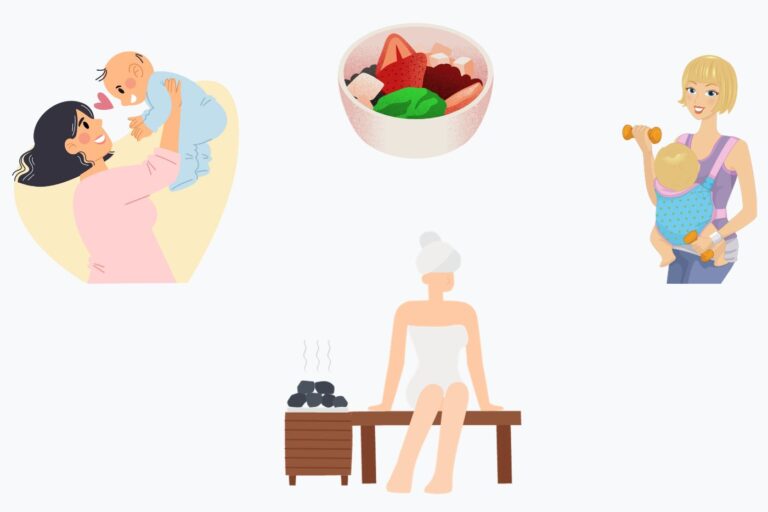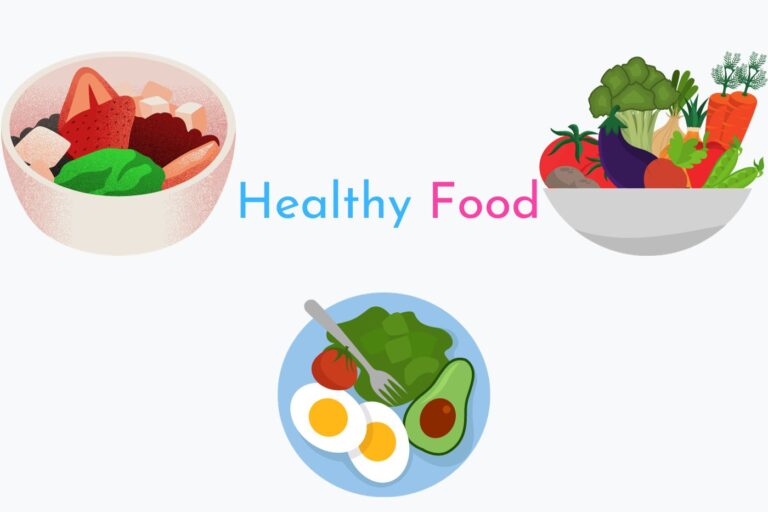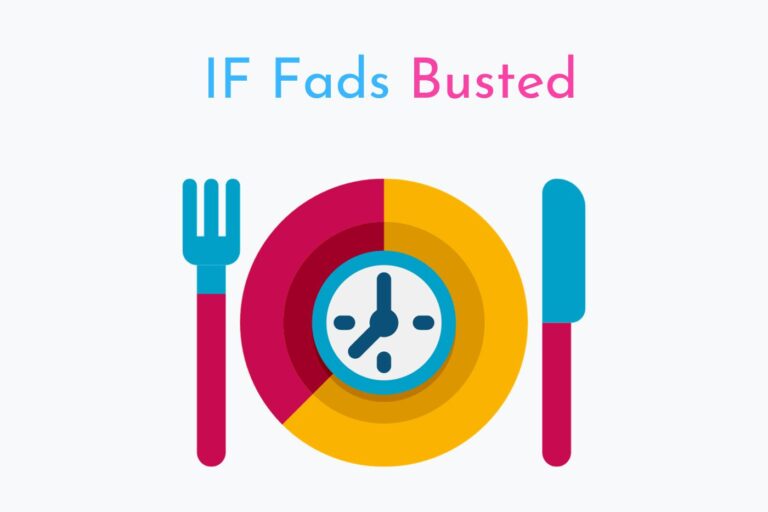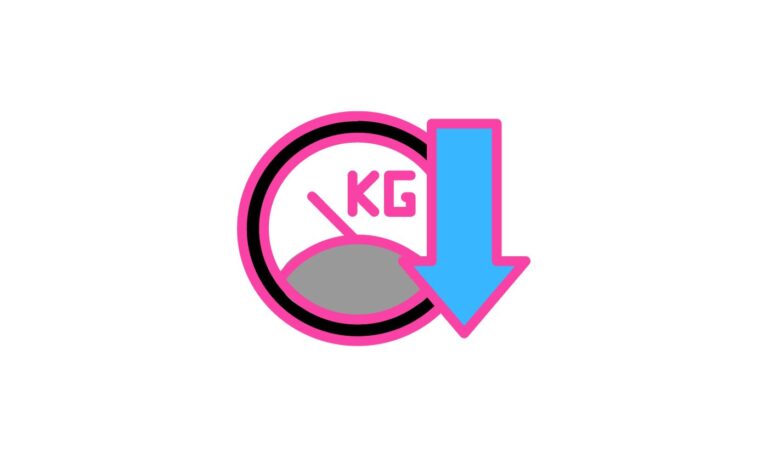Should Breastfeeding Moms Do Intermittent Fasting?
Know how you can enjoy fasting while breastfeeding
My second born was about 5 months old when I discovered I’d put up so much weight. I knew the best way to shed the extra pounds was intermittent fasting.
But should breastfeeding moms do intermittent fasting?
Again, how could I limit my eating window while my mother was encouraging me to eat for two and my doctor recommended enough food to cater to the nutritional needs of my little one?
So, I started a journey of research and understanding, and based on my experiences, I can confidently state, yes breastfeeding moms can do intermittent fasting but with caution.
But before you start, let’s explore some things to help you come up with something that works for you.
Shall we?
Section 1: Understanding Intermittent Fasting
1.1 What is Intermittent Fasting?
Intermittent fasting (IF) is a dietary approach that involves alternating between periods of feasting and fasting.
While it may seem like a recent trend, IF has deep historical roots and is supported by scientific research as a potential means of promoting overall health.
Our ancestors went through periods of feast and famine, and our bodies have evolved to adapt to these cycles.
Intermittent fasting capitalizes on the body’s ability to switch between using glucose (sugar) and stored fat for energy.
When we eat, our bodies break down the food into glucose, which is used for immediate energy, stored as glycogen in the liver and muscles or stored as fat if there’s excess.
During fasting, the body starts tapping into stored fat for energy.
1.2 How Does Intermittent Fasting Work?
Intermittent fasting works by initiating various physiological changes in the body during fasting periods. Here’s how it unfolds:
1. Insulin Levels Drop: When you stop eating, insulin levels decrease. Insulin is a hormone responsible for transporting glucose into cells for energy or storage. Lower insulin levels mean the body starts using stored fat for energy.
2. Cellular Repair: During fasting, the body goes through a process called autophagy, which is the removal of damaged cells and cellular components. This promotes overall cellular health and rejuvenation.
3. Hormone Regulation: IF can lead to beneficial changes in hormones related to weight management, including increased levels of human growth hormone (HGH). These hormonal changes support fat-burning and muscle preservation.
Breastfeeding and Nutritional Requirements
2.1 Nutritional Needs of Breastfeeding Moms
While considering intermittent fasting, it’s crucial to understand the specific nutritional requirements for breastfeeding moms:
1. Increased Caloric Needs: Breastfeeding burns extra calories, estimated at around 300-500 calories per day, depending on factors like the baby’s age and how frequently they feed.
These calories are necessary to produce breast milk and sustain both your and your baby’s energy needs.
2. Balanced Diet: To ensure your milk is rich in nutrients, maintain a balanced diet that includes a variety of foods from different food groups. Aim for a mix of vegetables, fatty proteins, healthy fats, and complex carbohydrates. Reduce wheat products, sugar, and processed foods.
3. Hydration: Staying well-hydrated is essential for milk production. Aim to drink plenty of water throughout the day.
Dehydration can affect milk supply, so pay attention to your body’s signals for thirst.
Tea and coffee are dehydrating agents so should be minimized or eliminated altogether.
2.2 Balancing Intermittent Fasting with Breastfeeding
Now that we’ve discussed the unique nutritional demands of breastfeeding, let’s explore how you can balance intermittent fasting with maintaining a healthy milk supply:
1. Choose a Fasting Method with Caution: Not all intermittent fasting methods are suitable for breastfeeding moms.
Some, like extended fasting or very low-calorie diets, may not provide the necessary energy and nutrients for milk production. It’s crucial to choose an approach that aligns with your needs.
2. Pay Attention to Eating Windows: When fasting, consider your baby’s feeding schedule. Try to plan your fasting periods when your baby feeds less frequently. In my case, I found fasting the whole night and a few hours in the morning worked perfectly.
3. Nutrient-Dense Foods: Opt for nutrient-dense foods during your eating windows to ensure you’re getting the essential vitamins, minerals, and calories needed for both you and your baby. Incorporate foods like proteins, whole grains, fruits, vegetables, and healthy fats.
4. Monitor Your Milk Supply: Keep a close eye on your milk supply as you begin intermittent fasting. If you notice any decrease in milk production or other concerns, consider adjusting your fasting schedule or consulting with a lactation consultant or healthcare provider.
Section 4: Intermittent Fasting Strategies for Breastfeeding Moms
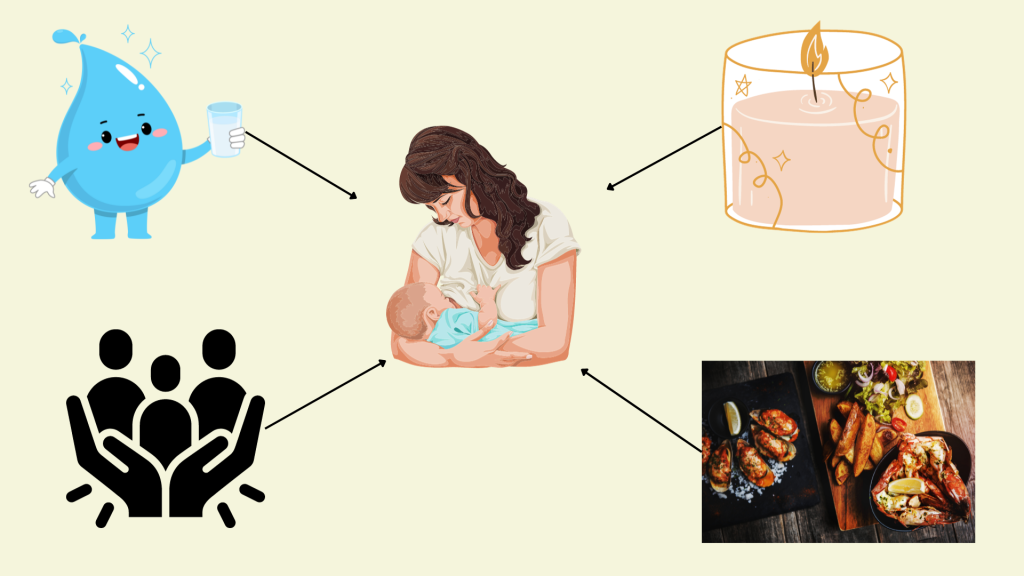
Let’s explore specific intermittent fasting strategies and tips tailored to breastfeeding moms.
4.1 Modified Fasting Methods
Choosing the right intermittent fasting method is crucial when breastfeeding. Some modified approaches can be more suitable for your unique situation:
1. Time-Restricted Eating (16/8 Method):
In this approach, you fast for 16 hours and eat during an 8-hour window.
During the eating window, ensure you eat a balanced diet with adequate proteins, complex carbohydrates, natural fats, and vegetables. This will eliminate the need for snacking and you can enjoy a high satiety of up to 6 hours between meals.
About 3 meals a day is ideal. Breakfast at 8 a.m, lunch at noon, and dinner at 4 p.m
Word of Caution
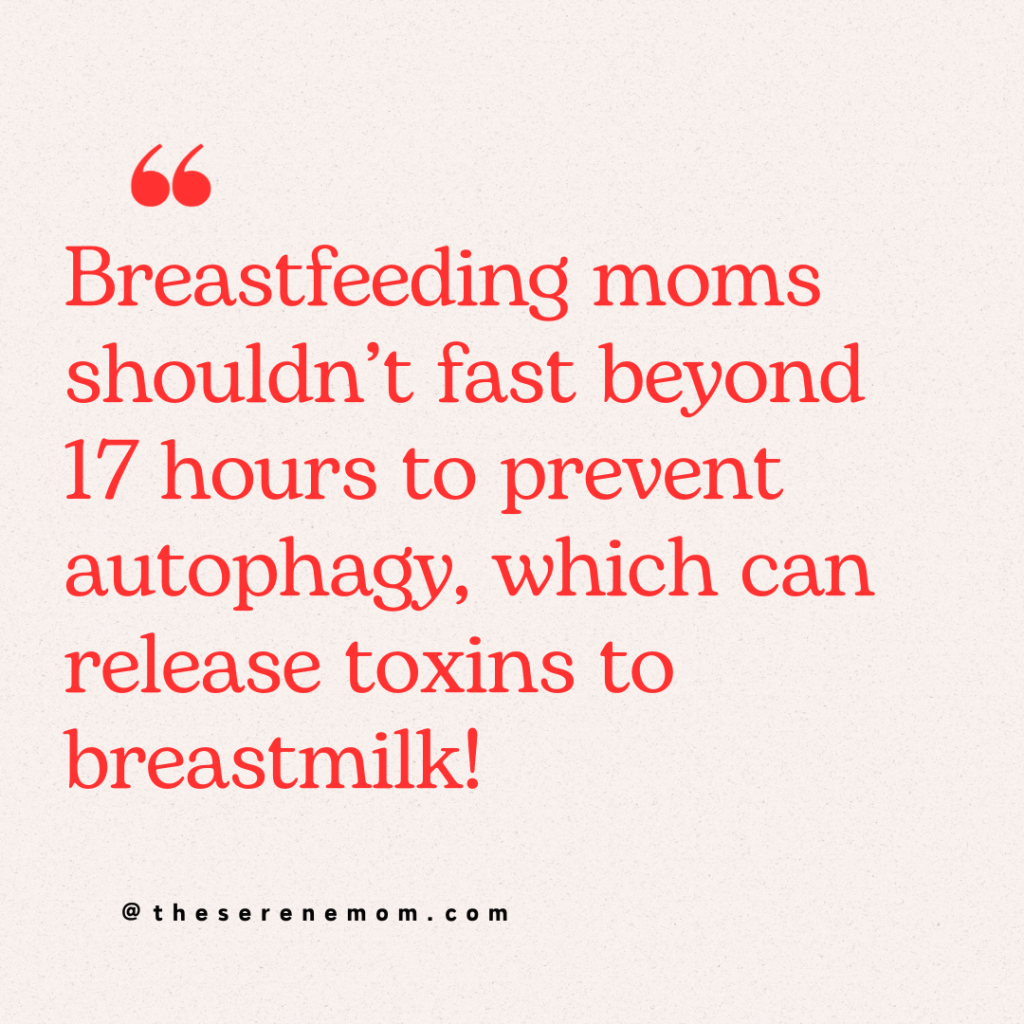
Fasting beyond 17 hours switches your body to autophagy. In this state, your body is detoxifying and removing environmental pollutants and other toxins. Some of this can end up in the breast milk.
Longer fasts should wait until you’re done with breastfeeding
4.2 Hydration and Fasting
Staying well-hydrated is crucial while practicing intermittent fasting here’s how to ensure you maintain proper hydration:
1. Water
Drink ample water during fasting and non-fasting hours. Aim to consume at least 8-10 cups of water daily. Sip water throughout the day to stay hydrated.
You can sprinkle a pinch of pink salt (and no salt won’t increase your blood pressure levels unless you are already hypertensive).
You could also take lemon water or water with cucumber slices.
2. Herbal Teas
Enjoy caffeine-free herbal teas like green tea, chamomile, or ginger during fasting periods.
These can help quench your thirst while providing additional health benefits.
3. Electrolytes
Consider adding electrolyte-rich foods like bananas or coconut water to your diet to replenish essential minerals.
4. Bone Broth
Bone broth is a great source of hydration and nutrition. It’s loaded with calcium, which is an essential nutrient for nursing moms.
You can add ginger, garlic, and carrots to enhance its nutritional value.
Section 5: Benefits of Intermittent Fasting for Breastfeeding Moms
These are some of the benefits of intermittent fasting
5.1 Improved Insulin Sensitivity
Intermittent fasting enhances insulin sensitivity, a key factor in managing blood sugar levels. This benefit can be valuable for postpartum moms, as insulin resistance can sometimes develop during pregnancy. Improved insulin sensitivity may help with:
- Better blood sugar control
- Weight management, especially postpartum weight loss
- Reduced risk of type 2 diabetes in the long run
5.2 Enhanced Metabolic Health
Embracing intermittent fasting can lead to favorable changes in various aspects of metabolic health, including:
- Weight Regulation: IF may help you achieve and maintain a healthy weight by controlling calorie intake and promoting fat loss.
- Blood Lipid Profile: Some studies suggest that intermittent fasting can improve cholesterol levels and reduce the risk of heart disease.
- Cellular Health: Autophagy, the cellular repair process activated during fasting, can contribute to healthier cells and tissues.
5.3 Potential Mental and Emotional Well-being

Balancing the demands of motherhood with self-care is essential. Intermittent fasting may offer psychological and emotional benefits:
- Mental Clarity: Some individuals report improved focus and mental clarity during fasting periods.
- Mood Stabilization: Stable blood sugar levels can contribute to a more balanced mood and energy throughout the day.
- Empowerment: Successfully managing an intermittent fasting routine can boost self-confidence and a sense of accomplishment.
- Reduced risk of anxiety and depressive tendencies, making motherhood less stressful.
With IF and about 30 minutes of brisk walking daily, I enjoyed better moods, reduced irritability even with night sleep interruptions, and less fatigue.
While these potential benefits are promising, it’s important to remember that not everyone will experience the same outcomes.
Incorporating intermittent fasting should always prioritize your well-being and that of the baby.
Section 6: Tips for Implementing Intermittent Fasting Safely
Implementing intermittent fasting as a breastfeeding mom requires careful planning and consideration to ensure you’re meeting both your nutritional needs and those of your baby.
Here are practical tips to help you incorporate intermittent fasting safely and effectively:
6.1 Gradual Approach
Start with a gradual transition into intermittent fasting to allow your body to adapt. Begin by extending your fasting window by an hour or two each day until you reach your desired schedule.
This gradual approach can help minimize potential disruptions to your milk supply and energy levels.
6.2 Listening to Your Body
Pay close attention to your body’s cues during fasting periods. If you feel excessively hungry, weak, or dizzy, it’s essential to prioritize your health and nourishment.
It’s perfectly acceptable to adjust your fasting schedule or end a fast early if needed. After all, it’s not a death sentence and we are doing this long-term.
6.3 Consult with a Healthcare Provider
Continually consult with your healthcare provider, especially if you have concerns about how intermittent fasting may be affecting your milk supply or overall health.
They can provide guidance, monitor your progress, and make recommendations tailored to your unique situation.
6.4 Prioritize Nutrient-Dense Foods
During your eating windows, focus on nutrient-dense foods to ensure you’re meeting your nutritional requirements. Ensure you’ve proteins, healthy fats, complex carbohydrates and vegetables.
Cruciferous and leafy green vegetables increase satiety while supplying important minerals and vitamins. This reduces hunger pangs when fasting.
6.5 Maintain Hydration
Stay well-hydrated during fasting periods. Drinking water, bone broth, and caffeine-free herbal teas can help quench your thirst and support milk production.
Pay attention to your urine color as an indicator of proper hydration.
6.6 Monitor Milk Supply
Keep a close eye on your milk supply throughout your intermittent fasting journey. If you notice a significant decrease in milk production or changes in your baby’s feeding behavior, be ready to adjust your fasting schedule or seek guidance from a lactation consultant.
6.7 Be Flexible
Remember that flexibility is key when combining intermittent fasting with breastfeeding. Life as a new mom is unpredictable, and your baby’s needs may change from day to day.
Be prepared to adapt your fasting schedule as needed to ensure both you and your baby are well-nourished.
6.8 Self-Care and Reduce Stress
Prioritize self-care alongside intermittent fasting. Ensure you’re getting enough rest, managing stress, and seeking support from friends and family.
High stress levels increase the cortisol hormone which can inhibit fat burning and result in emotional eating, which will minimize the benefits of intermittent fasting.
A well-balanced lifestyle is essential for your overall well-being.
Section 7: Intermittent Fasting Meal Ideas for Breastfeeding Moms
Practicing intermittent fasting while breastfeeding doesn’t mean sacrificing delicious and nutritious meals.
Let’s explore some meal ideas that can help you maintain energy levels, meet your nutritional needs, and enjoy your eating windows:
7.1 Meal Options
| Food Options | Great Foods | Foods to AvoidOr Reduce intake |
|---|---|---|
| Proteins | Foods to AvoidOr Reduce Intake | Artificial proteins Cured meats such as sausages and smokies Non-organic chicken/beef |
| Carbohydrates | Sweet potatoes Squash/pumpkins Green bananas Arrowroots Beans | Wheat products -Cakes and Bread Rice Fries and chips Cookies and crackers |
| Vegetables | Broccoli Cauliflower Raw carrots Tomatoes Cucumber Spinach Kales | Most vegetables are good and healthy |
| Extras | Groundnuts Cashew nuts Macadamia nuts Pumpkin seeds Chia seeds | |
| Fruits | Avocado Blueberries Green apples | Genetically modified and produced fruits. *most modern fruits are too sweetened with little fibre |
| Drinks | Genetically modified and produced fruits. *most modern fruits are too sweetened with little fiber | Sodas Fruit juices Fruit smoothies |
Frequently Asked Questions
Can breastfeeding moms do intermittent fasting?
Yes, breastfeeding moms can do intermittent fasting but they shouldn’t exceed 17 hours of fasting to prevent detoxification toxins from getting into breastmilk.
Can fasting lower the milk supply?
Fasting will not reduce breastmilk supply when it’s done gradually and if you feed on nutrient-dense foods. Also, proper hydration will maintain the milk supply.
How do I manage my breastfeeding while fasting?
Be intentional, start gradually, and listen to your body. Ensure you meet the baby’s needs and those of your body. When it’s too hard, it’s okay to stop fasting and eat a healthy, low-carb meal.

